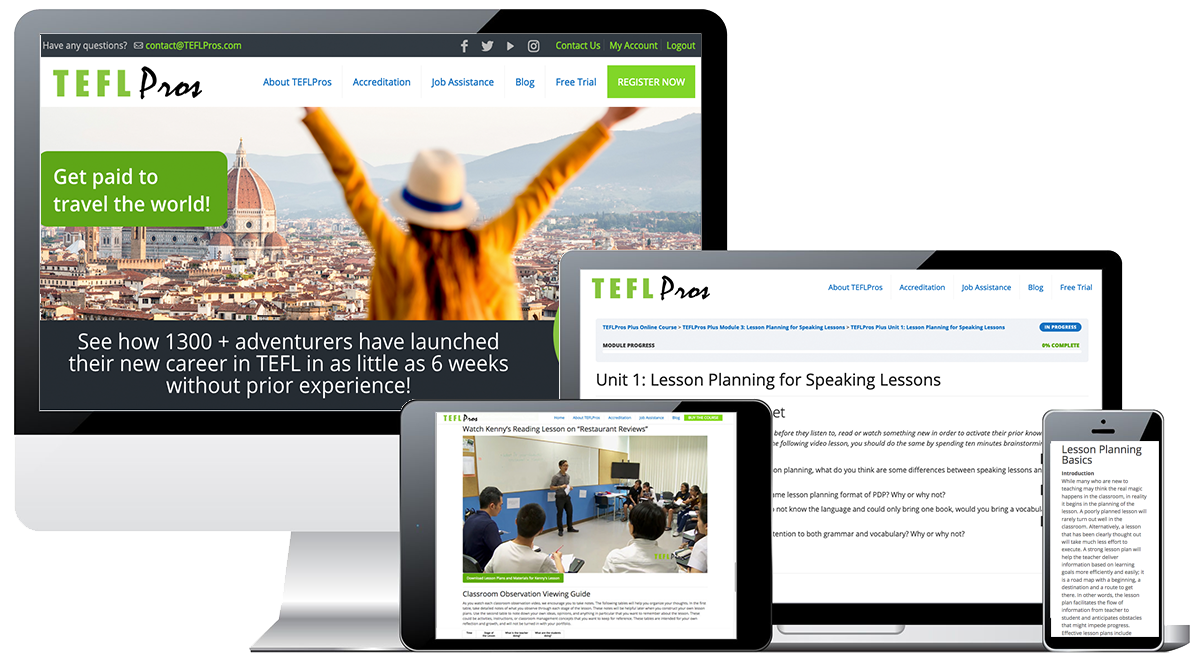Teaching English Online: How to Get Started
December 2, 2018
The Best Travel Gear for Couples
February 16, 2019
Getting Started in the TEFL Classroom

Getting started in the TEFL classroom can be daunting. Here are some tips to help you transition gracefully into your new role as a teacher.
Congratulations! You have just completed your TEFL certification. Now the question is – what’s next? Well, now there’s the “getting a job thing” and the “I have to teach real human beings thing”. Those parts of the TEFL journey can be a bit more intimidating and may even send your mind racing as to what skills you should focus on developing first. In this article we are setting out the key items we think should top your “new teacher to-do list” when you are getting started in the TEFL classroom.
Learn Your Students’ Names
Not so fast (we see you rolling your eyes), learning a lot of names that are from a different culture can be quite the skill. You may need several name games, a temporary name tag system or even some name tag games to help get you started.
We recommend learning your students’ names within the first week of term. At most language schools this would give you a couple classes to get those names under your belt.
What are the advantages to really learning your students names? Respect. Plain and simple. Human beings are programmed to feel a greater level of respect for someone who takes the time to call them by their name. Learning names will help build the type of rapport within your classroom that you want.
Another tip….learning all the names is not just on you. Your students should learn their classmates’ names as well. This way they will have an easier time interacting with one another during the term.
Give Clear Instructions
We cannot emphasize this one enough. Learning how to give clear instructions will make your life as a new teacher infinitely easier.
The mistake typically made is to over explain how the activity is going to run…aka telling the students steps 1-20 instead of steps 1-3 and then 4-6 and so on and so forth.
There are different techniques to achieve this goal. On our course we teach ICQs and chunking. But really anything that helps you break down what your students need to know into small manageable bits is probably going to do the trick.
Develop Your Eliciting Skills
One of the biggest faux pas new teachers make is speaking too much during their lessons. It’s any easy thing to do in the classroom, especially at first. Most people have an innate fear of silence and rush to fill that empty space with their own voice. A great way to ease out of this habit is to learn how to elicit.
Eliciting is a technique used by teachers to get answers and ideas from their students rather than giving them themselves.
Focus on eliciting from your students as much as possible. Begin with eliciting during simple tasks like brainstorms and work your way up to having your students create whole speaking interactions through eliciting words, phrases and question/answer patterns.
An often overlooked advantage of eliciting is in dealing with cultural differences. Let’s say you have a lesson on “celebrities”. What is going to be your easiest and most effective option? Researching celebrities from the country you are teaching in or simply asking your students to create the list themselves on the whiteboard? Chances are that their list will be far more accurate than yours anyway because they know more about their culture than you do. Therefore, let eliciting work for you to help you ease up on the teacher talking time and also up the level of relevance of your lessons for your students.
Use What You Have
A wonderful skill to learn as a teacher is how to use what you have. And if you can use what is available to you in a way that is unexpected, creative, or that makes life easier for both you and your students, then that’s even better!
Using what you have can take many forms. It can mean asking your students to take out 5 items from their bags while they practice the question form “What is…?” vs “What are…?” It could also translate into a teacher creating lessons from scratch because there is no textbook or workbook available.
This skill really just translates into being adaptable. And adaptable teachers are normally more aware and more relaxed because they feel comfortable in situations where most do not. Becoming well-versed in how to adapt your class according to different situations will also increase your self-confidence.
Happy Teaching!

